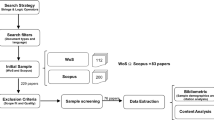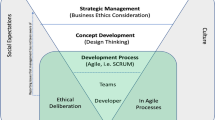Abstract
Software projects frequently finish late and over budget. Much of the research to date has characterized this problem in terms of inadequate project estimation or incomplete requirements determination. In this study, we concentrate instead on understanding the relationship between project duration and project effort. Over time, a dynamic environment contributes to the expansion of project requirements, thus increasing the scope and effort required to complete the project, irrespective of initial requirements and anticipated project size. Further, frequent delays and interruptions in a project contribute to greater effort each time work is resumed. We develop and empirically evaluate a two-stage model to relate project duration and effort. Our results indicate a significant and positive relationship between project duration and effort, controlling for anticipated project size and other project characteristics. Our model also provides an estimate for the rate of environmental change while projects are in progress. We demonstrate the practical implications of our model by showing how it can be used in conjunction with time boxing techniques and new development methodologies to better scope software projects.
Similar content being viewed by others
References
T.K. Abdel-Hamid, The dynamics of software project staffing: A system dynamics based simulation approach, IEEE Transactions on Software Engineering 15(2) (1989) 109-119.
T.K. Abdel-Hamid, Investigating the impacts of managerial turnover/succession on software project performance, Journal of Management Information Systems 9(2) (1992) 127-144.
T.K. Abdel-Hamid, A multiproject perspective of single-project dynamics, Journal of Systems Software 22(3) (September 1993) 151-165.
T.K. Abdel-Hamid and S.E. Madnick, The dynamics of software project scheduling, Communications of the ACM 26(5) (1983) 340-346.
T.K. Abdel-Hamid and S.E. Madnick, Impact of schedule estimation on software project behavior, IEEE Software (July 1986) 70-75.
A.J. Albrecht and J.E. Gaffney Jr., Software function, source lines of code, and development effort prediction: A software science validation, IEEE Transactions on Software Engineering 9(6) (November 1983) 639-648.
J.J. Baroudi and W.J. Orlikowski, The problem of statistical power in MIS research, MIS Quarterly (March 1989) 87-105.
D.A. Belsley, E. Kuh and R.E. Welsch, Regression Diagnostics: Identifying Influential Data and Sources of Colliearity (Wiley, New York, 1980).
B.W. Boehm, Software Engineering Economics (Prentice-Hall, 1981).
F.P. Brooks Jr., The Mythical Man-Month: Essays on Software Engineering Anniversary Edition (Addison-Wesley, Reading, MA, 1995).
B.L. Dos Santos, A management approach to systems development projects, Journal of Systems Management 37(8) (1986) 35-41.
N. Gaither, Production and Operations Management: A Problem-Solving and Decision-Making Approach, 4th edn. (The Dryden Press, Chicago, 1990).
W.H. Greene, Econometric Analysis, 3rd edn. (Prentice-Hall, Upper Saddle River, NJ, 1997).
D.E. Harter, M.S. Krishnan and S.A. Slaughter, Effects of process maturity on quality, cycle time, and effort in software product development, Management Science 46(4) (2000) 451-466.
M. Keil, Pulling the plug: Software project management and the problem of project escalation, MIS Quarterly 9(14) (December 1995) 421-447.
M. Keil, R. Mixon, T. Saarinen and V. Tuunainen, Understanding runaway information technology projects: Results from an international research program based on escalation theory, Journal of Management Information Systems 11(3) (Winter 1994-1995) 65-85.
C.F. Kemerer, Measurement of software development productivity, Ph.D. thesis, Carnegie Mellon University (1987).
P. Kennedy, A Guide to Econometrics, 3rd edn. (MIT Press, Cambridge, MA, 1994).
A.L. Lederer and J. Prasad, Causes of inaccurate software development cost estimates, Journal of Systems and Software 31 (1995) 125-134.
G. Moushino, Project management: Runaway! Systems International 18(6) (1990) 35-40.
T. Mukhopadhyay, S.S. Vicinanza and M.J. Prietula, Examining the feasibility of a case-based reasoning model for software effort estimation, MIS Quarterly 16 (June 1992) 155-176.
R.S. Pressman, Software Engineering: A Practitioner's Approach (McGraw Hill, New York, 1992).
L.H. Putnam and W. Myers, Measures for Excellence: Reliable Software on Time, within Budget (Yourdon Press, Englewood Cliffs, NJ, 1992).
D.B. Simmons, A win-win metric based software management approach, IEEE Transactions on Engineering Management 39(1) (February 1992) 32-41.
S.A. Slaughter, Software development practices and software maintenance performance: A field study, Ph.D. thesis, University of Minnesota (July 1995).
C.R. Symons, Function point analysis: Difficulties and improvements, IEEE Transactions on Software Engineering 14(1) (1988) 2-11.
Author information
Authors and Affiliations
Rights and permissions
About this article
Cite this article
Barry, E.J., Mukhopadhyay, T. & Slaughter, S.A. Software Project Duration and Effort: An Empirical Study. Information Technology and Management 3, 113–136 (2002). https://doi.org/10.1023/A:1013168927238
Issue Date:
DOI: https://doi.org/10.1023/A:1013168927238




